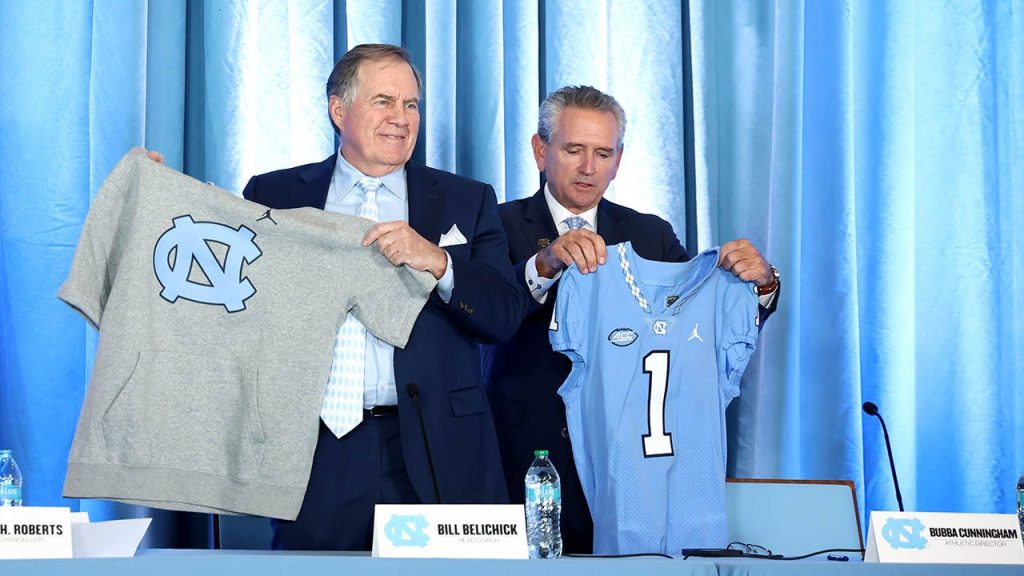Bill Belichick’s unexpected arrival at the University of North Carolina at Chapel Hill marks a significant turning point in his illustrious coaching career. After dominating the National Football League for decades, accumulating eight Super Bowl rings and establishing himself as one of the greatest coaches in NFL history, Belichick has embarked on a new chapter, accepting his first-ever college coaching position with the Tar Heels. This surprising move has generated considerable intrigue and speculation, with many questioning the motivations behind Belichick’s decision to leave the professional ranks for the collegiate landscape. However, Belichick’s actions and statements reveal a genuine enthusiasm for the opportunity and a deep-seated connection to the UNC program.
Belichick’s commitment to UNC is underscored by his extensive pre-arrival preparations. Before officially accepting the position, he engaged in conversations with some of the university’s most iconic alumni, including basketball legend Michael Jordan, NFL Hall of Famer Lawrence Taylor, and another gridiron great, Julius Peppers. These conversations, while their content remains undisclosed by Belichick himself, clearly played a significant role in solidifying his interest in the Tar Heels. The fact that he sought counsel from such prominent figures, particularly former players with strong ties to both UNC and his own coaching legacy, demonstrates a thoughtful and deliberate approach to this new challenge. Belichick’s respect for the UNC brand and its rich history, coupled with the “very supportive” responses he received from these influential alumni, cemented his decision to join the Tar Heels.
The significance of Belichick’s connections to Jordan and Taylor extends beyond mere alumni status. Jordan’s global impact as a basketball icon needs no elaboration, while Taylor’s connection to Belichick dates back to their shared time with the New York Giants, where they collaborated to win two Super Bowls. Peppers, a formidable force in the NFL, further strengthens the link between Belichick and UNC, having also played basketball for the Tar Heels. These connections highlight the intertwining worlds of professional and collegiate sports, and underscore the allure of UNC’s athletic legacy, which clearly resonated with Belichick.
Belichick’s five-year contract with UNC reflects a long-term commitment to the program. His statement that he “didn’t come [to Chapel Hill] to leave” emphasizes a desire to build something lasting and impactful. This contrasts with the speculation that surrounded his departure from the Patriots and subsequent interviews for NFL positions, suggesting that his decision to join UNC represents a genuine desire for a new challenge and a fresh start in a different environment. The length of the contract also indicates a belief in his ability to reshape the Tar Heels football program and elevate it to new heights of success.
The move to college football represents a significant shift for Belichick, who has spent nearly five decades immersed in the professional game. Despite his extensive experience and success in the NFL, he has expressed a long-held desire to coach at the college level, referring to the UNC opportunity as a “dream come true.” This reveals a different side to the often stoic and pragmatic coach, showcasing a personal aspiration that transcends the pursuit of championships and accolades. It suggests a deeper connection to the sport itself and a desire to contribute to the development of young athletes in a different context.
Belichick’s arrival at UNC has injected a renewed sense of excitement and anticipation into the program. His reputation as a meticulous strategist, a demanding leader, and a winner precedes him, creating a buzz of excitement among players, fans, and alumni alike. The Tar Heels are eager to embrace the “Belichick effect” and witness the transformation he brings to their football program. The challenge for Belichick will be to adapt his coaching style and philosophy to the collegiate level, while maintaining the core principles that have defined his success throughout his career. The coming years will reveal how Belichick navigates this new landscape and whether he can replicate his NFL success in the college ranks.










